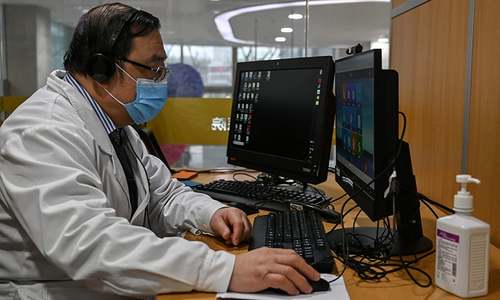In the small German town of Gross-Gerau, you don't go to the drive-through for a burger and fries. You go to get tested for the novel coronavirus.
Designed to minimise exposure to medical staff and patients, the drive-in at the local hospital is one of several unexpected ways healthcare providers are tackling a fast-spreading outbreak that has killed over 500 people across Europe.
“Extraordinary times call for extraordinary solutions,” doctor Roxana Sauer, a medical director at Gross-Gerau District Hospital, told AFP.
Since last week, suspected patients have been able to call ahead and consult a physician by phone, who decides whether they should be tested.
The person is then assigned a time slot and asked to park outside a side entrance of the hospital, where they are met by a doctor clad head to toe in protective gear.
After rolling down the car window, the potential patient is swabbed in the mouth or nostril before driving off again.
Their sample is sent to a lab which returns the result within 24 hours, of which the person is notified by phone.
Similar drive-through testing sites have sprung up in other German hospitals in recent days, as well as in South Korea, the United States and Britain.
“People love that it can be done so quickly and easily,” said Sauer.
The hospital's managing director Erika Raab added: “For Germans, the car is their safe space, it's where they feel comfortable.”
'Pizza pager'
Of the 32 tests carried out at the Gross-Gerau drive-through so far, none have come back positive.
But the hospital's coronavirus hotline has been ringing off the hook as residents in the rural area, famed for its asparagus farms, fret about a global epidemic that has sparked panic-buying, school closures and flight cancellations.
Germany itself has recorded over 1,100 cases and on Monday announced its first two deaths.
While Hesse state, where Gross-Gerau is located, remains relatively untouched with just a few dozen cases, staff at the hospital decided to be proactive and “get creative”, said Raab.
The hospital's next plan is to get an online “tele-doc” system up and running this week, she added.
The cyber-consultation will allow patients to talk to doctors without leaving their homes, expected to come in handy if more people have to self-isolate.
Since the coronavirus has coincided with a seasonal flu outbreak, the hospital is also creating an outdoor waiting area, to avoid those with flu symptoms sharing a waiting room with others.
Patients will wait in their car in the car park where an employee will hand out “pizza pagers”, like those used in restaurants, that vibrate when it's their turn to be seen, said Raab.
“We want to show people that we are taking their concerns seriously,” she said.
“So we asked ourselves what simple solutions we can come up with. Hysteria calms down when people see you are doing something.”
Theft
Other steps taken at the hospital include touchless hand sanitiser dispensers, and black-and-yellow construction tape to remind people to keep a safe distance at the reception desk — after finding that red markings blended in too well with the surroundings and were ignored.
Raab said she is convinced the German health system can handle the coronavirus storm, and stressed the collegiality and moments of solidarity that have brightened up a stressful time.
After hearing on the radio that toilet paper and sanitising gel were stolen from the hospital, a local woman recently donated over a dozen bottles of disinfectant.
The apparently remorseful thief later returned 10 of the stolen bottles, leaving them outside the building, unopened.
The hospital thanked the anonymous culprit on Facebook for doing the right thing — and encouraged other “sticky fingers” to do the same.
















































